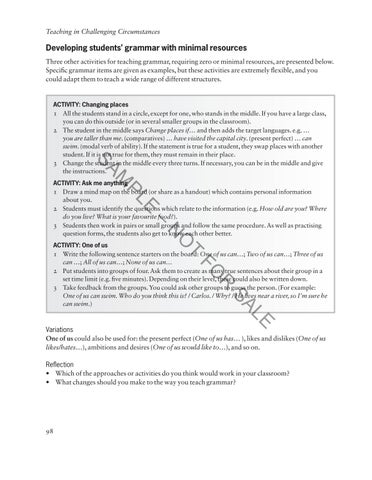Teaching in Challenging Circumstances
Developing students’ grammar with minimal resources Three other activities for teaching grammar, requiring zero or minimal resources, are presented below. Specific grammar items are given as examples, but these activities are extremely flexible, and you could adapt them to teach a wide range of different structures.
ACTIVITY: Changing places
1 All the students stand in a circle, except for one, who stands in the middle. If you have a large class,
M
SA
you can do this outside (or in several smaller groups in the classroom). 2 The student in the middle says Change places if… and then adds the target languages. e.g. … you are taller than me. (comparatives) … have visited the capital city. (present perfect) … can swim. (modal verb of ability). If the statement is true for a student, they swap places with another student. If it is not true for them, they must remain in their place. 3 Change the student in the middle every three turns. If necessary, you can be in the middle and give the instructions. ACTIVITY: Ask me anything
about you.
PL
1 Draw a mind map on the board (or share as a handout) which contains personal information
E
2 Students must identify the questions which relate to the information (e.g. How old are you? Where
–
do you live? What is your favourite food?).
3 Students then work in pairs or small groups and follow the same procedure. As well as practising ACTIVITY: One of us
O
N
question forms, the students also get to know each other better.
FO
can …; All of us can…; None of us can…
T
1 Write the following sentence starters on the board: One of us can…; Two of us can…; Three of us 2 Put students into groups of four. Ask them to create as many true sentences about their group in a
R
set time limit (e.g. five minutes). Depending on their level, these could also be written down.
3 Take feedback from the groups. You could ask other groups to guess the person. (For example:
LE
SA
One of us can swim. Who do you think this is? / Carlos. / Why? / He lives near a river, so I’m sure he can swim.)
Variations One of us could also be used for: the present perfect (One of us has… ), likes and dislikes (One of us likes/hates…), ambitions and desires (One of us would like to…), and so on. Reflection • Which of the approaches or activities do you think would work in your classroom? • What changes should you make to the way you teach grammar?
98
